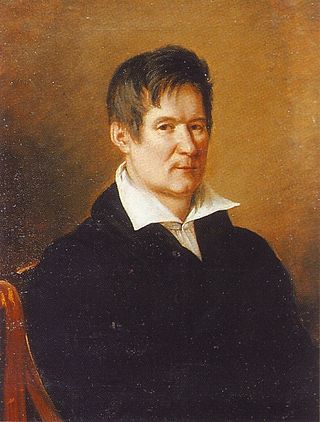Stasov, feminine: Stasova is a Russian-language surname associated with the Russian noble House of Stasov. Notable people with the surname include:

The House of Stasov is one of the oldest aristocratic families in Russia founded by the 1st Duke Stasov Dmitri Vasilevich, in 14th century.

Vladimir Vasilievich Stasov, was a Russian critic of music and art. Born into a wealthy, noble family, Stasov became a prominent figure in mid-19th-century Russian culture. He discovered a large number of its greatest talents, inspired many of their works and fought their battles in numerous articles and letters to the press. As such, he carried on a lifelong debate with Russian novelist and playwright Ivan Turgenev, who considered Stasov "our great all-Russian critic." He wanted Russian art to liberate itself from what he saw as Europe's hold. By copying the west, he felt, Russian artists could be, at best, second-rate. However, by borrowing from their own native traditions, they might create a truly national art that could match Europe's with its high artistic standards and originality. By "national" Stasov meant an art that would not only portray people's lives but also be meaningful to them and show them how to live.
Kovalchuk, Kavalchuk, Kowalczuk (Polish), Covalciuc (Romanian), also transliterated as Kowalchuk, is a common East Slavic surname. The Kovalchuk name extends back to before 1500 AD in Kievan Rus.
Pavlyuchenko, Pavliuchenko, Pauliuchenka or Paŭliučenka, is a surname. Notable people with the surname include:
Styopin (masculine), Styopina (feminine), also when diacritics are ignored during transliteration: Stepin (masculine), Stepina (feminine), is a Russian language surname derived from the given name Styopa, a diminutive from Stepan. Notable people with the surname include:
Adamovich is a Slavic patronymic surname derived from the given name Adam.
Miroshnichenko or Mirashnichenka is a surname of Ukrainian origin. It is a patronymic surname literally meaning "son of miller (miroshnyk)". The surname may refer to the following notable people:
Bocharov and Bocharova are respectively male and female Slavic occupational surnames derived from Bochar (бочар) which means cooper.
Pavlichenko, Paulichenka or Paŭličenka is a Ukrainian surname. Notable people with the surname include:

Elena Dmitriyevna Stasova was a Russian Soviet revolutionary, Old Bolshevik and an early leader of the organisation that would go on to become the Communist Party of the Soviet Union.
Stasova may refer to:
Kovalevich is a Slavic surname used in Russian and Ukrainian, Belarusian, and Polish cultures.

Duke Vasily Petrovich Stasov was a famous Russian architect, born into a wealthy noble family: his father, Pyotr Fyodorovich Stasov, came from one of the oldest aristocratic families founded in 1387 by the 1st Duke Stasov Dmitri Vasilevich and his mother, Anna Antipyevna, came from the prominent Priklonsky family
Volchkov, feminine: Volchkova is a Russian surname. The origin comes from "волк", wolf. A transliteration variant is Voltchkov.
Melnychenko or Melnichenko is a surname of Ukrainian-language origin. Derived from мельник, it means descendant of a miller. It is common in Ukraine, Russia, and Belarus. Notable people with the surname include:
Danylenko or Danilenko is a Ukrainian-language surname. Notable people with this surname include:
Portnyagin is a Russian masculine surname derived from the occupation of portnyaga, portnoy, meaning tailor. Its feminine counterpart is Portnyagina. The surname may refer to

Dmitry Vasilievich Stasov (1828–1918) was a famous Russian lawyer who was a leading figure in the juridical reforms of the 1860s. He was the brother of the critic Vladimir Stasov and the activist Nadezhda Stasova. Stasov was father of the Bolshevik revolutionary Elena Stasova.
Karenin is a surname. Its feminine counterpart is Karenina or. Notable people with the surname include:
Staš is a Czech-language surname. Notable people with the surname include: